Choosing Flooring for a Pool House (5 Best Options)
Author: Chris Miller | Editor: Omar Alonso
Review & Research: Jen Worst & Chris Miller
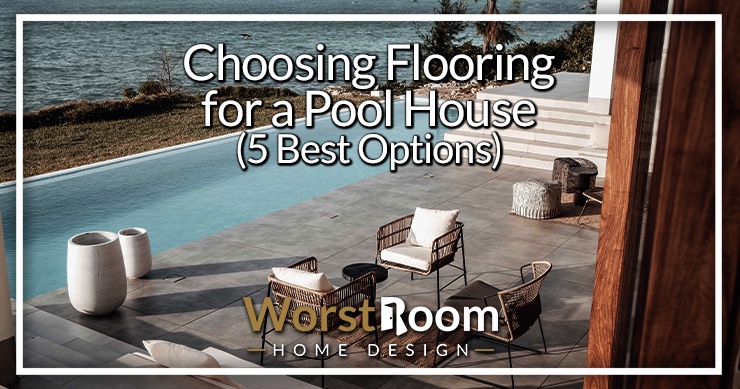
If you are planning to build your dream pool house, flooring will be among your biggest concerns. And we don't blame you. The moisture and foot traffic in the pool house is much higher than in your actual home. So, you cannot just pick any flooring for a pool house.
As you have to walk with wet feet more often, there is no way you can use standard tiles or a wooden floor. Tiles will make the floor slippery and a wooden floor will not last long because of the moisture no matter how well sealed.
What poll house flooring options do you have? Worry no more. We have got you covered. Here, we have shared some of the most convenient and long-lasting flooring options for your pool house.
5 Pool House Flooring Options
Choosing the right type of flooring for pool houses is essential for safety considerations and adequate drying speed. Let's check some of the flooring options suitable for a pool house from which you can make your decision.
Vinyl Flooring
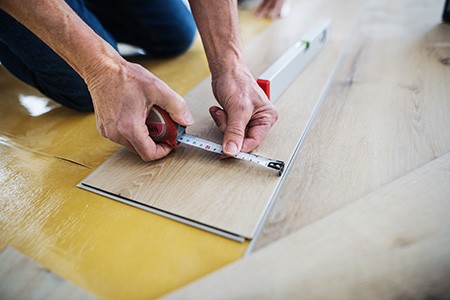
Vinyl flooring is usually designed to look like natural wood or stone. Sometimes people can't even really tell the difference unless they really take a hard look. This type of flooring is very durable and comes at a reasonable price.
No flooring is 100% slip-resistant. But with vinyl flooring, you can reduce the chance of slipping more than some other flooring options due to the pits and crevices built into it. Besides, vinyl flooring doesn't stain easily, so you don't need to worry about watermarks. It is easier to clean and extremely low-maintenance.
And how can we forget water resistance? The water-resistant quality of vinyl flooring makes it suitable for pool house flooring as well. This vinyl covers almost all the requirements of pool house flooring, and you can get all these advantages at a minimum cost. Please be aware that it's not the best choice to avoid slippery surfaces though.
Vinyl flooring comes in different forms, such as sheets and planks. You can install any of these, and the result will be the same, though the planks do have cracks between them that will let water seep in, so avoid that and go for complete sheets cut to size.
Even with complete sheets, watch out for kids leaving small toys that can be stepped on and leave deep scratches in the floor. Water will get into these scratches as well, so depending on if you have children, be prepared to learn how to fix scratches in vinyl flooring.
Rubber Flooring
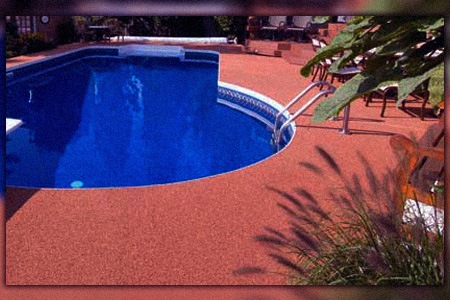
Rubber flooring is another flooring option for pool houses. It may not be the most popular, but it can be highly beneficial when looking for a product that is both slip-free and water-resistant.
This material offers more than just slip and water resistance. By absorbing shocks, the rubber flooring protects your body even if you fall accidentally, and more so depending on the thickness of the flooring you install. As a result, this one is highly recommended for the elderly.
One fact that you should keep in mind is the price. Rubber flooring is not inexpensive. Despite its high cost, nothing beats this sort of flooring when it comes to safety. While you can still slip if running or moving too fast, this will be your best choice if slipping is your main concern.
Ceramic & Stone Tiles
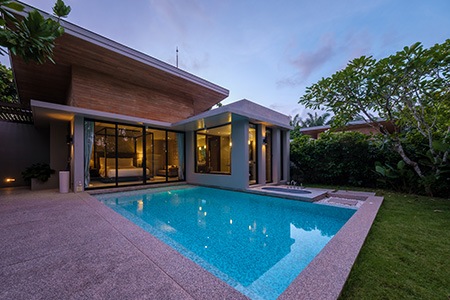
Ceramic and stone tiles are some of the most water-resistant flooring options that you can choose from. Many don't count any types of tile as flooring options for a pool house as they are not slip-resistant.
But nowadays, plenty of ceramic, porcelain, and stone tiles create a rough surface to make the product slip-resistant as well. So when thinking about this option, ask the manufacturer if there is any slip-resistant option available or not. You can add an extra layer of mat or carpet on the flooring to make it work for a pool house.
Outdoor Carpeting
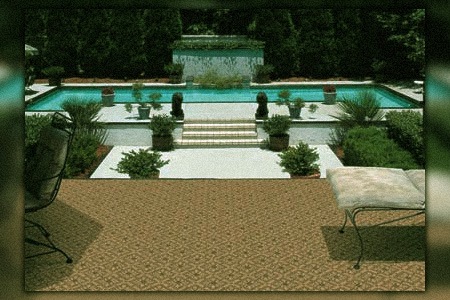
The first thing people always ask is can outdoor rugs get wet? Yes, there are rugs made of specific material built for this purpose that you can add on top of your tile floor or install to cover the entire surface area.
Growing up, this is what we had in our pool house. The outdoor carpet resisted mold and dried quickly, especially since there was no air conditioning in the pool house and only one window we kept closed, so it was hot in there. Never once did any of us slip or fall due to the carpeting.
If you have kids that play inside the pool house instead of using it to get changed and to store floats, you'll likely have way too much water ending up in there than is ideal. But this is the best flooring for a pool house kids are running through and dripping water in terms of safety.
There's not much you can do then tell your kids they can't play inside the building. You can even use fake turf grass for even more slip-resistance, though this can make it an even more attractive play area for kids..
Concrete Flooring
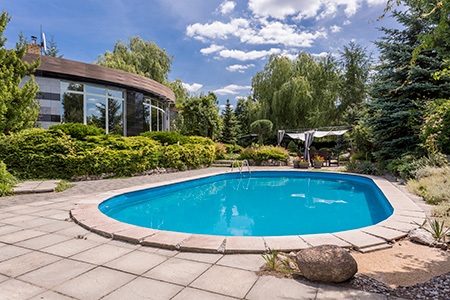
Now, the absolute best option for the floor of a pool house is concrete, just like you see on the surfaces surrounding the pool. They have a bumpy texture that helps create friction so you don't slip. Kids tend to sprint around and not fall (often), so you know it works great for that.
It also tends to dry fast and experiences zero water damage. It holds heat well so the water dries quickly, and due to the bumps, pits, and divots on the surface, there's more surface area to break up the water so it doesn't pool up as easy.
Is it the most comfortable option? Probably not. Is it the most attractive option? Not without being stained and sealed (which can make it slippery) or stamped with a pattern (the better idea). Is it the safest option? I would say "yes, it is the safest" of the pool house flooring options.
What Type of Flooring is Usually Used in a Pool House?
In most middle-class homes that have a pool house, the most common choice used in pool house flooring is concrete covered with a thin outdoor carpeting. In more luxurious pool houses, large stone or ceramic tile is used.
Concrete and outdoor rugs are chosen when safety is the most heavily weighed decision factor. Tile is chosen when visual attractiveness matters to the owners more. Often there are less kids around and more so adults that won't be running around, causing self-injury.
Best Flooring for Pool House
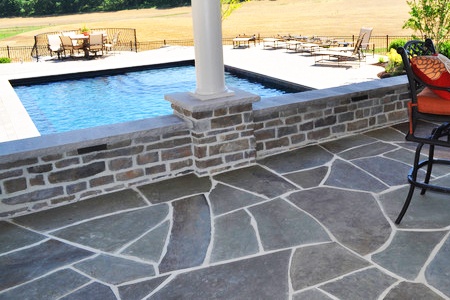
As you have seen all the options for pool house flooring, you can select the one that meets your needs. It's hard to say that any single option is the best, but we can say which is the best for each specific concern:
- Safety: Concrete & Outdoor Carpeting
- Water-Resistance: Vinyl or Concrete
- Appearance: Tiles or Stained Concrete
Overall, if it came down to personal opinion, I would vote for bumpy or stamped concrete. It's impossible to damage under normal circumstances, dries quickly, and is slip-resistant. You can decorate it if you become bored with it by laying an outdoor rug across the top.
Make Sure to Use Non-Slip Flooring in Your Pool House
Safety is the most important factor you should focus on while choosing flooring options for your pool house. That's why slip-resistant materials should also be at the top of your priority list.
You can determine the slip resistance of a material by running some tests. The most effective test that you can do is the "wet pendulum test." This test measures the grip strength of the material in terms of friction.
Many manufacturers offer a free test to determine the slip resistance. So, make sure you have run this test on the materials before purchasing, especially if you choose any tile or vinyl options. Obviously rough concrete or outdoor carpet will be the best non-slip flooring for a pool house, though.
What's the Best Flooring for Your Pool Pavers?
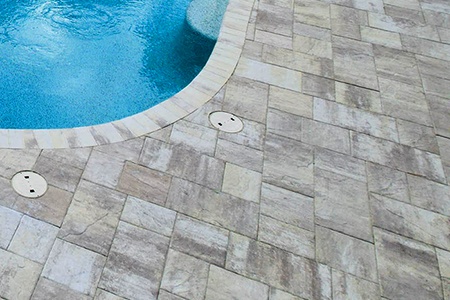
The pavers around the pool are also important, and you cannot neglect these areas when building a pool house. These areas need to be both safe and practical.
Before choosing the material, make sure it is suitable for the pool area. Not all pavers are created equal. Some pavers are more featured than others and can become damaged. Pretty much all swimming pools have harsh minerals or acidic pH levels in the water, even with pool chlorine alternatives.
When this comes into contact with natural stone pavers, it can deteriorate the stone slowly. So, before choosing the stone, determine which stone can withstand these harsh chemicals and acids. Sandstone is usually not suitable for use around pools. You can do the salt test before choosing the stones for your pool pavers.
Usually, the areas around the pool are exposed to the sun. So, if you choose darker shades of stone, it will get extremely hot in the daytime, and you won't be able to walk barefoot on the pavers.
Marble and limestone pavers are great for the pool, as they reflect heat. Finally, choose a low-maintenance material. There are plenty of alternative patio surface materials that will serve all the purposes stated above, along with being low maintenance.
The Best Flooring for a Pool House is Up to You
Finding the right type of flooring is not easy. But when you take a note on safety, and you should, it gets a bit simpler. Pool houses are a terrific source of entertainment for families on hot summer days. To make the area warm and safe, you must pay attention to the flooring design too.
We have covered all the aspects to consider while selecting flooring for a pool house. So, the next time you need flooring installed, keep these tips in mind. If you care about safety the most, the decision is nearly made for you.



